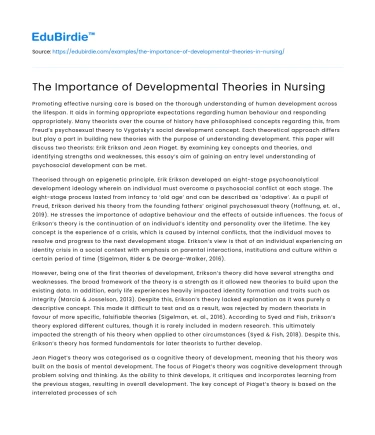Promoting effective nursing care is based on the thorough understanding of human development across the lifespan. It aids in forming appropriate expectations regarding human behaviour and responding appropriately. Many theorists over the course of history have philosophised concepts regarding this, from Freud’s psychosexual theory to Vygotsky’s social development concept. Each theoretical approach differs but play a part in building new theories with the purpose of understanding development. This paper will discuss two theorists: Erik Erikson and Jean Piaget. By examining key concepts and theories, and identifying strengths and weaknesses, this essay’s aim of gaining an entry level understanding of psychosocial development can be met.
Theorised through an epigenetic principle, Erik Erikson developed an eight-stage psychoanalytical development ideology wherein an individual must overcome a psychosocial conflict at each stage. The eight-stage process lasted from infancy to ‘old age’ and can be described as ‘adaptive’. As a pupil of Freud, Erikson derived his theory from the founding fathers’ original psychosexual theory (Hoffnung, et. al., 2019). He stresses the importance of adaptive behaviour and the effects of outside influences. The focus of Erikson’s theory is the continuation of an individual’s identity and personality over the lifetime. The key concept is the experience of a crisis, which is caused by internal conflicts, that the individual moves to resolve and progress to the next development stage. Erikson’s view is that of an individual experiencing an identity crisis in a social context with emphasis on parental interactions, institutions and culture within a certain period of time (Sigelman, Rider & De George-Walker, 2016).
Save your time!
We can take care of your essay
- Proper editing and formatting
- Free revision, title page, and bibliography
- Flexible prices and money-back guarantee
However, being one of the first theories of development, Erikson’s theory did have several strengths and weaknesses. The broad framework of the theory is a strength as it allowed new theories to build upon the existing data. In addition, early life experiences heavily impacted identity formation and traits such as integrity (Marcia & Josselson, 2013). Despite this, Erikson’s theory lacked explanation as it was purely a descriptive concept. This made it difficult to test and as a result, was rejected by modern theorists in favour of more specific, falsifiable theories (Sigelman, et. al., 2016). According to Syed and Fish, Erikson’s theory explored different cultures, though it is rarely included in modern research. This ultimately impacted the strength of his theory when applied to other circumstances (Syed & Fish, 2018). Despite this, Erikson’s theory has formed fundamentals for later theorists to further develop.
Jean Piaget’s theory was categorised as a cognitive theory of development, meaning that his theory was built on the basis of mental development. The focus of Piaget’s theory was cognitive development through problem solving and thinking. As the ability to think develops, it critiques and incorporates learning from the previous stages, resulting in overall development. The key concept of Piaget’s theory is based on the interrelated processes of schema, assimilation and accommodation, which come together into four cognitive stages: sensorimotor, preoperational, concrete operational and formal operational. The schema is an efficient method of problem solving that helps the individual overcome the challenge they are experiencing. Assimilation is the interpretation and response to new experiences with relation to existing schema. Finally, accommodation occurs when a child adjusts pre-existing schema when the previous is no longer valid (Sigelman et. al., 2016).
Being one of the base theories for cognitive development, Jean Piaget’s theory left a lasting imprint on developmental theories of modern times. Piaget’s theory of equilibrium is a clear explanation of problem solving and decisive thinking, which allows the individual to adapt from the experience (Hoffnung, et. al., 2019). He acknowledged that children are active in their developmental growth through the nature-nurture theory. Further, changes in the quality of a child’s thinking could be concluded. Weakening his theory, Piaget greatly underestimated the cognitive abilities of children as well as the role of parents on the child’s development (Sigelman et. al., 2016). He also assumed that children from all cultures and races developed the same way, though in modern times, it is clear that children in western civilisations develop differently to ‘hunter-gatherer’ groups. Observational evidence was also much more prevalent than evidence based on experiments (Lally & Valentine-French, 2019).
To conclude, developmental theories provide nurses with theoretical understanding of how a patients’ health and recovery can be impacted by psychological and social factors. Effective nursing care is developed through thorough knowledge of psychosocial development, whether it is psychoanalytical, cognitive or any other category. In the modern day, it is imperative that previous theories are still acknowledged and new theories are built to ultimately improve and advance nursing.






 Stuck on your essay?
Stuck on your essay?

